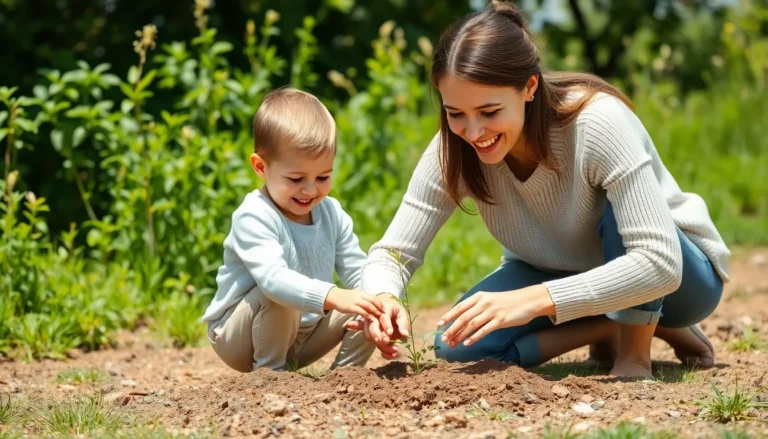Table of Contents
ToggleCreating a Roblox game is like opening a treasure chest of endless possibilities. Imagine crafting your own virtual world where players can embark on epic adventures, battle fierce monsters, or simply hang out with friends. With Roblox, the only limit is your imagination, and maybe your coffee supply.
Understanding Roblox Game Development
Roblox game development offers a unique platform for creativity and innovation. Users can design engaging experiences that captivate players worldwide.
What Is Roblox?
Roblox is an online platform combining gaming and game creation. Users can play games created by other users while also creating their own. It features a diverse range of genres, from role-playing to obstacle courses. The platform supports both 2D and 3D environments, allowing for a rich visual experience. Additionally, it provides tools like Roblox Studio, which simplifies the game development process. Community engagement fosters collaborations, enabling developers to share resources and enhance their creations.
Why Create Your Own Roblox Game?
Creating a game on Roblox allows individuals to express their creativity. It becomes a way to share ideas with an audience while developing critical skills in design and programming. Gamers enjoy the thrill of seeing their concepts come to life. Financial opportunities also exist, as successful games can generate revenue through in-game purchases. Personal fulfillment follows as developers witness players enjoying their hard work. Overall, making a game on Roblox presents opportunities for fun, learning, and potential income.
Planning Your Game Concept
Planning is essential when creating a Roblox game. Defining the core idea provides direction for development.
Identifying Your Target Audience
Identifying the target audience shapes the game experience. Determine the age group that finds your concept engaging. Knowing whether players prefer action, exploration, or creativity guides design choices. Consider conducting surveys or researching popular games to gather insights. Understanding preferences influences game mechanics, visuals, and overall tone. Ultimately, an audience-focused approach ensures a more enjoyable experience for players.
Choosing a Game Genre
Choosing a game genre significantly impacts development. Options include adventure, simulation, or role-playing, each offering unique gameplay elements. Selecting a genre allows designers to streamline features and mechanics. Popular genres often correlate with player interests and trending games in the Roblox community. For example, obstacle courses attract users who enjoy challenges. Analyze existing games for inspiration and identify gaps in the market for original concepts. Genre selection lays the foundation for engaging gameplay and player retention.
Setting Up Roblox Studio
Setting up Roblox Studio is the first step toward creating a unique game. Users need the application to design and develop their games.
Downloading and Installing Roblox Studio
To download Roblox Studio, visit the official Roblox website. Clicking the “Create” button prompts the installation process. Once downloaded, run the installer and follow the on-screen instructions. After installation, launching Roblox Studio only requires a double-click on the application icon. Users should ensure a stable internet connection during installation to avoid interruptions.
Navigating the Roblox Studio Interface
Upon opening Roblox Studio, the user encounters a clean interface designed for ease of use. The Explorer panel displays the hierarchy of game objects, providing a structured view to manage elements. It’s helpful to use the Properties panel to adjust object attributes effectively. Various templates on the home screen allow for quick project initiation. Familiarizing oneself with the toolbox reveals a plethora of models, scripts, and plugins that enhance game development. Each panel contributes to a streamlined workflow, making navigation intuitive for new developers.
Designing Your Game
Designing a Roblox game involves creating immersive environments and populating them with engaging characters and items. This process requires careful consideration to enhance player experience significantly.
Creating Game Environments
Game environments serve as the backdrop for player engagement. To create vibrant landscapes, developers should utilize Roblox’s extensive library of terrain and building tools. Incorporating various themes such as fantasy or futuristic elements can elevate the narrative. Lighting and special effects also play a significant role, as they set the mood and atmosphere. Using tools like Terrain and Parts in Roblox Studio allows for detailed customization. Developers should ensure a balance between aesthetics and functionality to keep players captivated.
Adding Characters and Items
Characters and items bring game worlds to life. Designers need to consider attractive designs, animations and interactive properties. Using customizable avatars allows players to express their uniqueness, enhancing connection to the game. Incorporating a range of items like weapons or power-ups encourages player exploration and interaction. Developers can access models from the Toolbox to speed up this process. Creating unique behavior for characters, such as NPCs with specific roles or quests, enriches gameplay and keeps players engaged longer.
Scripting Mechanics
Scripting mechanics form the backbone of Roblox game creation. Mastering these skills enables developers to shape interactive experiences and engage players effectively.
Introduction to Lua Scripting
Lua serves as the primary scripting language within Roblox. This lightweight scripting language caters to developers by providing a simple syntax that’s both accessible and powerful. Users can easily learn to write scripts for various game functions and mechanics. Customizing game behavior becomes possible through scripts that respond to player actions or events in the environment. Resources, such as tutorials and community forums, offer opportunities to enhance scripting knowledge. Gaining familiarity with key concepts, like variables, functions, and events, paves the way for crafting unique gameplay experiences.
Implementing Game Logic
Implementing game logic adds depth and interactivity to Roblox games. Developers often use scripting to create mechanics that drive player engagement. Utilizing conditionals, loops, and events, developers can respond to in-game scenarios. For example, triggering specific actions when players complete objectives or collect items enhances gameplay. Scripting allows for adding features like scorekeeping or timers, which contribute to competitive gameplay. Testing and refining these mechanics during development ensures a polished user experience. Continuous iteration on game logic leads to smoother interactions and improved player satisfaction.
Testing Your Game
Testing your game ensures a smooth and enjoyable player experience. Players encounter various issues, so identifying and debugging common problems becomes essential.
Debugging Common Issues
Developers often face glitches or unexpected behaviors in their games. To troubleshoot effectively, utilize the output panel in Roblox Studio, which displays error messages and warnings. Tracking down issues might involve checking script lines or verifying object properties. Many developers find that adjusting variables or correcting logic flows resolves most problems. Testing the game regularly during development helps catch issues early before they escalate. Developers can also collaborate with peers to spot overlooked errors. Remember, fixing bugs enhances gameplay quality and boosts player satisfaction.
Gathering Feedback from Players
Gathering feedback from players provides invaluable insights into gameplay experience. Developers can share beta versions of their games with a select group of testers, ensuring diverse perspectives. Players often highlight areas for improvement, such as mechanics or balancing issues. Asking specific questions encourages detailed responses, guiding developers on what to refine. Engaging with players through forums or social media fosters community support and investment in the game’s success. Regularly implementing player feedback not only improves the game but also builds a loyal player base. Continuous feedback loops remain critical in evolving a game to meet player expectations.
Publishing Your Game
Publishing a game on Roblox marks an exciting milestone in the creation process. Developers share their hard work with the community, making it accessible to players worldwide.
Steps to Publish on Roblox
To publish a game, developers open Roblox Studio, then select the “File” menu. Afterward, they choose “Publish to Roblox As” for a prompt to enter the game title and description. Additionally, setting privacy settings ensures that the game is either public for all or private for select players. An understanding of the target audience influences these decisions, helping developers tailor their game’s presentation. Following these steps accurately leads to a successful launch, maximizing player engagement from day one.
Promoting Your Game
Promoting the game requires strategic planning. Utilizing social media platforms like Twitter, Discord, and Facebook effectively increases visibility. Engaging with the Roblox community encourages players to share their experiences, creating excitement around the game. Collaborating with influencers who specialize in game content helps reach wider audiences. A well-crafted promotional video presenting the game’s features, gameplay, and unique elements significantly boosts interest among prospective players.
Creating a game on Roblox is a thrilling journey that opens doors to creativity and innovation. With the right tools and a clear vision, anyone can transform their ideas into immersive experiences that captivate players. Engaging with the community and embracing feedback can significantly enhance the development process, leading to a polished final product.
As developers publish their games, they not only share their creations but also contribute to a vibrant ecosystem of creativity. The skills gained through this process extend beyond game design, fostering teamwork and problem-solving abilities. With dedication and passion, anyone can succeed in the dynamic world of Roblox game development.







